This week, I interviewed freelance composer Akash Thakkar!
Name: Akash Thakkar.
Occupation: Freelance composer and sound designer for games, and game audio educator.
Hobbies: Two of Akash’s favorite hobbies are Wing Chun Kung Fu and strength training. They both influence many aspects of his life.
==========
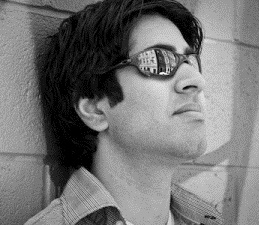
Joseph: Welcome to Five Question Interviews! I hope you enjoy your time here, as we delve deep into the burning questions on everyone’s minds.
As you know, Five Question Interviews is a unique interview format in which you will only be asked five questions (excluding follow-up questions), derived from your own interests and fan suggestions. I have compiled some good questions from myself and readers, so prepare yourself!
Akash: I’m excited to hear what you throw at me!
Question #1: As a composer, what do you feel has had the biggest influence on your personal musical style?
A: Of course, listening to as much music as possible has been crucial, but honestly, most influences come from non-musical places. Ideas often spring to mind when I’m in the gym, going for a walk, traveling, etc. That being said, my biggest musical influences are Yasunori Mitsuda and Diego Stocco.
J: Do you have any classical or jazz influences?
A: I do! I’m a HUGE fan of Holst, Mahler, and Ravel on the classical side of things. As for jazz influences, I’ve always loved Pat Metheny. And Django Reinhardt!
J: Sounds like a pretty solid list!
Are there any video game soundtracks that have had significant influence on you as a composer?
A: Absolutely. The Chrono Cross soundtrack was probably the biggest moment in my life as a composer. After hearing the intro track (“Time’s Scar”) I listened to it almost every day for about two years. I still go back to that soundtrack regularly and marvel at it.
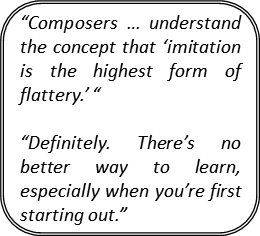 J: Did Chrono Cross ever end up inspiring one of your own works?
J: Did Chrono Cross ever end up inspiring one of your own works?
A: Throughout my time at Berklee, I think almost everything I wrote for composition assignments was trying to sound like that soundtrack. I eventually broke away from trying to emulate that style, but it was all I wrote for a good chunk of time.
J: I think it’s safe to say that composers, above all other creative artists, fully understand the concept that “imitation is the highest form of flattery.”
A: Definitely. There’s no better way to learn, especially when you’re first starting out.
Question #2: When did you begin composing? Why did you start?
A: I actually didn’t start until I went to Berklee in 2008. Until I entered the school, I wanted to do the whole rock star thing and tour the world as a drummer. Honestly, the performance thing was actually working out quite well, but I was SO tired of lugging my drum set everywhere, so I started hanging out with the composers at school and learned through them. I was also a founding member of the Video Game Orchestra, which is now an internationally renowned group. I had the great honor of playing on stage with Nobuo Uematsu, and decided then and there “I want to do what he’s doing.”
J: Did you have any experience with sound design at this point?
A: Zero!
When my friends talked about sound design, it seemed like this insane, mystical practice that I would never end up doing. Lo and behold, I now do sound design professionally as well as music!
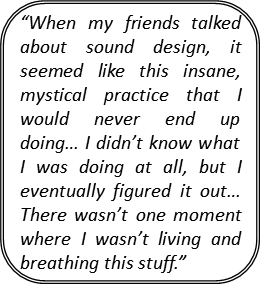 J: So you basically had to start from scratch while earning your degree.
J: So you basically had to start from scratch while earning your degree.
A: 100%. I didn’t know what I was doing at all, but I eventually figured it out. In fact, in my last couple semesters at the school, I was even teaching my own tiny voluntary game audio class on the side, while also holding weekly meet ups for students as part of the Video Game Music Club.
J: It sounds like you completely immersed yourself, which I suppose is what every creative student should strive to do.
A: Yeah, there wasn’t one moment where I wasn’t living and breathing this stuff. I still have TONS to learn, but it was a great time for sure.
J: Speaking of Berklee, this summer at RTX I had the pleasure of meeting Jeff Williams, a professor at Berklee and well-known composer for Rooster Teeth’s Red vs. Blue and RWBY. I actually mentioned you in conversation – since you hosted a panel at last year’s RTX – and while he knew your name, he said he had never actually taught any of your classes.
A: He never did teach me, but we became good friends through my time there!
J: Are there any professors who had a huge impact on your development as a composer and sound designer?
A: Yes, there is a guy teaching there named Jeff Baust who is an incredible composer, sound designer, engineer, and teacher. He taught this class where you had to write music for a different client every single week. The client’s demands were just short of being totally insane, and Jeff (posing as the client) would either “hire” or “fire” you depending on what you brought to class that day. I got fired every single week.
J: That sounds like a wicked fun class! Of course, this is coming from a fellow masochist… I mean composer.
A: There is also the game audio professor, Michael Sweet, who has written music for a lot of famous games, and made the Xbox 360 startup sound. He taught me stuff that I still use every single day.
J: You mentioned earlier that you are an accomplished drummer. What other musical experience did you have prior to when you started composing?
A: WAS a drummer. I haven’t played in about 2 years at this point! I have since switched to playing cello, piano, and guitar. Drums are just too impractical to move around and play! I had no other musical experience other than drums until going to Berklee, so I had basically no music theory knowledge beyond the basics, no ear training, and no software skills.
I worked hard to teach myself everything I could before going to the school, but there was still a huge rush of info as soon as I got there.
J: It’s never too late, kids.
A: Never!
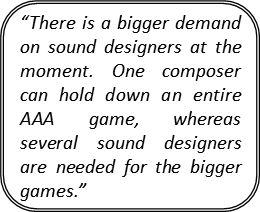 Question #3: Here’s a tricky question for you. Would you say there is a bigger demand in the video game industry on sound designers or composers? Does this vary depending on the genre, or size of the company, or some other factor?
Question #3: Here’s a tricky question for you. Would you say there is a bigger demand in the video game industry on sound designers or composers? Does this vary depending on the genre, or size of the company, or some other factor?
A: Good question! There is a bigger demand for sound designers at the moment. One composer can hold down an entire AAA game, whereas several sound designers are needed for the bigger games. As for the indie world, a good chunk of small teams prefer to hire someone who can handle both music and sound. That being said, there’s still a good demand for both. You just need to know where to look!
J: Do you typically find jobs that allow you to work on the music and sound design simultaneously, or do you more often find yourself doing either one or the other? I know currently you are the sound designer for Hyper Light Drifter, but someone else is writing the music.
A: It varies from project to project. In Hyper Light Drifter‘s case, there are so many assets that are needed, that it just makes the most sense to split up the tasks between two people. But for smaller games, or games with longer timelines, I often handle both. There are also times where I handle the implementation of music/sound as well.
J: You bring up another good point. You’ve said on several occasions that you try to familiarize yourself with more of the video game making process than just music and sound. One of the things you have made a point of learning is implementing music and sound into the game.
A: Yeah, I took a long time to learn how to implement music/sound into games. In fact, I feel that even having a basic knowledge of that side of things is massively important. I’ve been hired purely because of my implementation abilities before, and it certainly makes my demos stand out when I show some cool ways of how music/sound can be put into the game.
 Question #4: You have mentioned that you wanted to discuss how important failure is for anyone looking to work in a creative field. What would you like to share on the subject?
Question #4: You have mentioned that you wanted to discuss how important failure is for anyone looking to work in a creative field. What would you like to share on the subject?
A: Yeah! I want to let people know that failure is important. In fact, it can be more of a learning experience than any of your successes. Any time you see someone score an awesome gig, or create something incredible, they failed hundreds of times before getting to that point. I know some of the highest level composers in the industry, and even they have a 50% rejection rate. The point is to get used to this, and be able to learn from each of these events whenever they come up.
My life’s philosophy is, “If I’m not screwing something up every single week, then something is horribly wrong.”
J: Your class with Jeff Baust, the one where you were “fired” every week, must have been great preparation for that then, if not a motivator.
A: It was great! In fact, I was just rejected for a gig yesterday. I was all smiles because I learned a lot from the experience. It doesn’t even feel the slightest bit disheartening anymore.
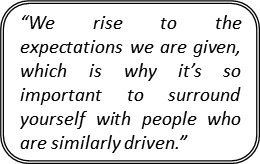 J: I would almost say that if you set out to “fail” at something on a regular basis – and by that, I mean set an unrealistic goal such as a ridiculously complicated sound or ambitious piece of music – you might occasionally surprise yourself with the results.
J: I would almost say that if you set out to “fail” at something on a regular basis – and by that, I mean set an unrealistic goal such as a ridiculously complicated sound or ambitious piece of music – you might occasionally surprise yourself with the results.
A: Totally. We rise to the expectations we are given, which is why it’s so important to surround yourself with people who are similarly driven.
J: That’s a lesson anyone can benefit from. Surround yourself with people doing what you want to do.
Question #5: As an educator, you have two important events coming up, PAX Dev and PAX Prime. What can you tell us about these events and what you will be presenting?
A: Very excited for those two panels. At PAX Dev, I am on a panel that will be discussing the roles of different audio professionals in the game industry. We’ll be covering everything from hiring a composer, to how to take care of music rights.
At PAX Prime, me and two fellow indie composer/sound designers will be discussing how to break in to the industry! We’ll be sharing our triumphs, failures, and hilarious stories while (hopefully) imparting some practical wisdom for those looking to make a career from game audio!
J: Now I really wish I could go to both of those conventions! That sounds like very important information for anyone hoping to break out into the industry.
A: I believe they will be recorded. At the very least, the Prime panel will be recorded!
J: I would love to have a link to those panels so I can share it with my readers.
A: Sure, let me grab both of those for you.
PAX Dev: http://dev.paxsite.com/schedule/panel/game-audio-pipeline-core-concepts-and-roles
PAX Prime: http://prime.paxsite.com/schedule/panel/from-square-waves-to-symphonies-creating-great-game-audio
J: It’s good to see artists such as yourself who are knee-deep in the industry actually taking steps to help the next generation. Video game music and sound is one of the few fields that still has an air of mystery about it.
A: It does have a weird mystery to it. Hopefully I can help people realize it’s really not so complicated!
J: I greatly enjoyed your panel at RTX 2013 where you began to delve into what is required of a composer and sound designer. It was fascinating to see where the two almost became one.
A: I’m really glad to hear that! Thank you!
J: Thank you for taking the time to meet with me today! However, we’re not finished just yet.
One of the unique elements of Five Question Interviews is that now that the interview is complete, you have a chance to ask me one question. What have you prepared for me?
A: I do have one prepared!
If you could give a call to the 18-year old Joseph Dunlap, what would you tell him?
J: Now THAT is a good question.
Does the call have a time limit?
A: Hahaha I want to hear it all!
J: I’m just assuming I won’t have time to tell myself all the winning lottery numbers for the next 10 years!
I would begin by encouraging myself to continue to work hard at composition. College was, at times, discouraging when it came to finding time and desire to write. I would also encourage myself to avoid distractions and focus on honing my art. I would give myself a warning that the approval of my peers should not affect my opinion of myself or my music.
I would also encourage myself to go to class more often! If for no other reason than student loans.
A: Good advice! The good opinion of others isn’t always a good thing.
J: One thing I’ve learned is wanting the approval of others seldom acquires the approval of others.
A: Definitely true.
J: Thanks for taking our interview through such a deep turn!
A: That was a great answer!
J: Again, thanks for meeting with me today. I look forward to seeing what projects you end up working on in the future!
A: Thanks! It was awesome to talk to you. You had some really fantastic questions.
J: I certainly can’t take full credit, but thank you! I always want my readers to get beyond the surface of a subject. Be sure to come back soon!
If you want to know more about Akash Thakkar, you can find him at:
- Website: http://www.akashthakkar.com/
- Twitter: http://www.twitter.com/akashthakkar
- Facebook: http://www.facebook.com/akash.thakkar
- SoundCloud: http://www.soundcloud.com/athakkar
Have a question for Akash that has not yet been asked? Do you want to see Akash return and answer more of your questions? Suggest more questions below! Did you enjoy the interview? Leave your feedback below, subscribe, and share with your friends!